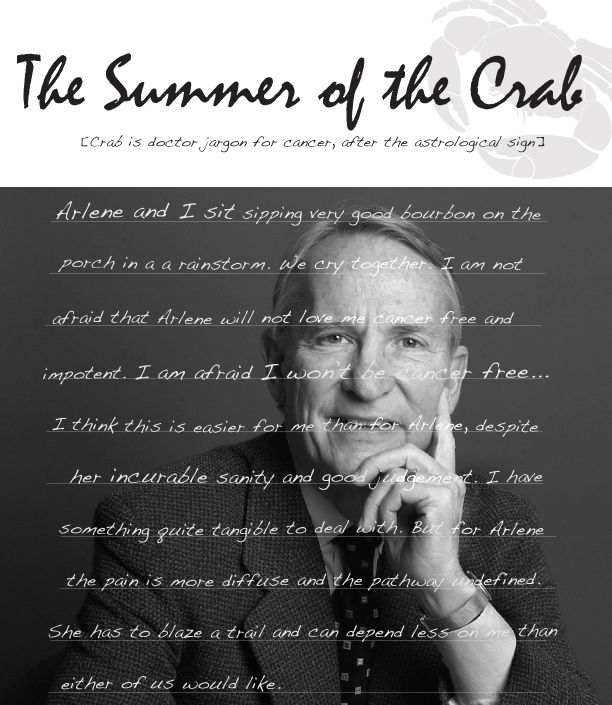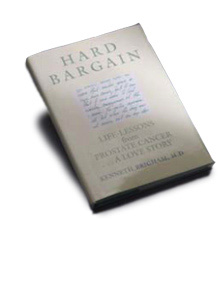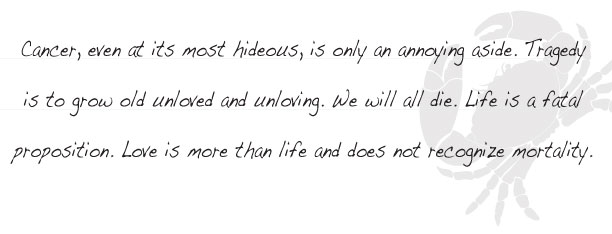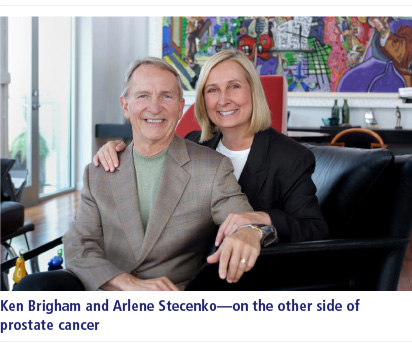|














|
 |
| |
|
|
| |
| |
|
|
 Kenneth
Brigham, associate vice president and director of Emory’s
Predictive Health Institute, was 56 years old when he was diagnosed
with prostate cancer, a disease that killed his father. During his
treatment and healing, he kept a journal of his experience, Hard
Bargain: Life lessons from prostate cancer. . .a love story, published
by Harpeth House in 2001 and available on Amazon.com. Hear
Brigham read excerpts from the book. Kenneth
Brigham, associate vice president and director of Emory’s
Predictive Health Institute, was 56 years old when he was diagnosed
with prostate cancer, a disease that killed his father. During his
treatment and healing, he kept a journal of his experience, Hard
Bargain: Life lessons from prostate cancer. . .a love story, published
by Harpeth House in 2001 and available on Amazon.com. Hear
Brigham read excerpts from the book. |
|
| |
|
|
 |
If
you are a man and you live long enough, you
will have prostate cancer. If you are a woman and you live long
enough, someone you love will have prostate cancer. That will continue
to be true until someone can figure out why it happens and how to
prevent it….
Because prostate cancer is
insidious, it is easy to deny. Men don’t want to know that
their PSA* is increasing and don’t have to know for a long
time. So, even with such a simple and sensitive blood test for early
detection, . . . most of these cancers are discovered too late for
a sure cure. Most men, even knowing they are at risk, just don’t
get the test, don’t want to know.
I hope this book will change your
mind about that. It is possible to delay dealing with reality, but
reality in this case is not static—the reality gets a lot
worse with time. And the reality can be dealt with, the tragedy
experienced, without losing your sense of humor. Also, crises of
this sort can nurture relationships. If there is a single most important
lesson here it is that relationships are what you really care about,
whether you admit it or not.

This is harder than I thought it would
be. It is not a surprise. My father died of prostate cancer when
I was 15. The disease is no stranger. My PSA has been on the rise
for over a year. The damn thing was there. I knew it. [My doctor]
Jay knew it. One time I said to him, "Why don’t you
just take it out?"’
"You operate on a cancer, not
a PSA," Jay said. "We have to find it first."
So this is not a big surprise. But
that doesn’t matter, doesn’t soften the blow of finality,
irrevocability. I have cancer. I am not the same person I was 15
minutes ago, before I had cancer.

1) Do nothing. Prostate
cancers grow very slowly. I would likely live five years or more
even if I did nothing. I am 56 years old now and otherwise in perfect
health. I do not want to live five years. I want to live a lot longer
than that. [My wife] Arlene agrees. We will do something.
2) External irradiation.
This works. The cure rate is somewhat less than surgery, but it
is noninvasive. The incidence of impotence is eventually about the
same as with surgery. The radiation treatments virtually always
cause inflammation of the bladder and rectum. I hate hearing about
all of this, sitting here trying to think objectively about the
choices, trying to act as though I am not frightened. I squeeze
Arlene’s hands.
3) Brachytherapy.
This is where they implant little radioactive seeds in your prostate
gland. It has the great advantage of minimal complications (with
this disease, "complications" always mean the two I’s,
impotence and incontinence). Brachytherapy has the major disadvantage
that the cure is not permanent. The cancer comes back in five or
six years. That is far too soon to suit me.
4) Radical prostatectomy.
This is "the operation." Bob Dole had it. Marion Barry
had it. Timothy Leary, I suspect, did not have it and he is, right
now, dying of prostate cancer on the Internet. Maybe LSD helps.
. .
Everybody has some incontinence for
a while. It goes away in 98% of people. Those are pretty good odds.
Impotence, inability to have a penile erection, is another matter.
The nerves that control the blood
flow to the penis run right on top of the prostate gland. Those
are the nerves critical to the function under discussion. If you
cut those nerves, an unaided erection is impossible. . .
I can image having prostate cancer.
I cannot imagine being impotent. Apparently the operation leaves
everything else—libido, sensations, even orgasm—intact.
How totally weird.
God drives a hard bargain. |
 |
 |
 |
| |
|
|
 |
| |

I spent last week at work telling people that I have cancer. It
is exhausting work. Rehearsing repeatedly the history, the therapy,
the prognosis, is physically exhausting. I guess it makes you deal
with the specifics, expose every possible nuance of the process,
but it is exhausting.

The psychological experience is more important than the physical
one. Arlene and I talk about that. Jay says I no longer have cancer,
and I believe that to be true. I have a lot of tubes in various
natural and man-made orifices. I have a sore belly. But I probably
do not have cancer. The hollow space in the middle of my chest seems
to have filled. The tendency for my eyes to fill with tears when
they meet Arlene’s is gone. Although it makes my belly hurt,
I can laugh again. The pain will go away. I trust the laughter will
endure.

After any surgery in or around the abdomen, bowel habits assume
extreme importance. While I was in the hospital, multiple layers
of health care professionals inquired frequently and in salacious
detail about bowel habits, carefully distinguishing between gas
and the real thing. I felt like a two-year-old in potty training
when I finally produced to a standing ovation from the team of white-coated
voyeurs.

Jay pulled the catheter Monday afternoon, and it hurt like hell.
The pain didn’t last long. Now, two days later, I am virtually
completely incontinent. I must wear those big diaper things all
the time and change them frequently. Apparently the duration of
the incontinence is unpredictable. It can last a few days to weeks
to months. It is better than the catheter, but only just. It is
hard to get much done when you are constantly concerned about whether
you have wet your pants.

I wet my pants again without realizing it last evening. We sat in
the living room. I was half into my second martini. It hadn’t
happened for a while. I was depressed again. The experience triggers
an emotional response much larger than the facts deserve. The feelings
are helplessness, embarrassment, like a small child. And the latent
fear that I am, in fact, still ill. That the cancer is still there
somewhere and that the ever-present smell of urine is, as I recall
it, the harbinger of a dark fate. Maybe the whole business of medicine
is a futile effort to thwart the inevitable. We are, after all,
mortal. If I am cured of prostate cancer, I will die of something
else. I hope it smells different.
|
|
| |
|
|
| |
 |
|
| |
|
|
| |

There is this little problem of impotence.
There are some other options, but Jay suggests to start with "Farmer
Osbon’s Wonderful Erection Machine."
Jay tells us this story for the truth.
It seems that several years ago there was a farmer in Georgia who
was impotent. Farmers, at least successful ones, are problem solvers
and entrepreneurs, and they are not at all daunted by the mechanics
of sex. Breeding farm animals involves an entire armamentarium of
procedures, devices, and manipulations of the animal psyche to assure
the fruitful marriage of sperm and egg.
So Farmer Osbon figures that if the
penis won’t fill up from the inside, maybe you could inflate
it from the outside. He made a big tube with a vacuum pump on one
end that could fit over the penis, pump it up with a vacuum, and
then keep it up by putting a rubber band around the base of the
penis to hold the blood in until you were ready to let it down.
He made the device and used it, and it worked.
Farmer Osbon had two young daughters.
He packed up his machine and two daughters and went to a national
urologists meeting, set up a booth, and hawked his wares. He wore
his farmer overalls. Apparently he and his device were the big urologist
joke of the meeting.
Farmer Osbon is dead now, but his
heirs are, undoubtedly, all multimillionaires. The current generation
of his device is one of the most popular and successful means of
dealing with impotence in the world.

Sex is one of those things that is better done than talked about.
Sex is quintessential nonverbal communication. When one tries to
put words to the music, dissonance is inevitable. Arlene and I talk
sometimes about sex, but mostly without words.
I find myself now compelled to talk
about sex with people whom I hardly know. I have enormous respect
for Jay Smith as a urologist, but I hardly know him, and I am acutely
uncomfortable discussing my sex life with him. The same goes for
his nurse.
Also, the discussions seem all wrong.
The discussions are all about mechanics, which never before seemed
an issue to me. If the magic is there the mechanics take care of
themselves.
But not when you whack out those blessed
vasomotor nerves. . .

I entered the new millennium with a PSA of zero, four years out
from the surgery. I do not have and will never have prostate cancer.
I will die of something else.
…The blue diamond cured my impotence;
that little pill rescued Bob Dole and me from having to choose between
celibacy and contrivance. The little blue diamond not only takes
care of the technicality but also restores the magic. Bob and I
are fortunate to be alive at all, but especially fortunate to be
alive now.
Jay Smith’s colleague is taking
care of my incontinence by injecting collagen at critical sites.
It is working. I imagine the inside of my bladder neck looking like
Julia Roberts’ lips.
On a lovely Saturday afternoon, Arlene
and I drive to Franklin just to be together and enjoy the day. We
eat lunch at a quaint old restaurant on Main Street. We order a
bottle of champagne, and when the young waiter brings it he says,
"This must be a special day."
"Yes," I reply. "Every
day is a special day." |
|
| |
|
|
| |
|
|
|
|
|

